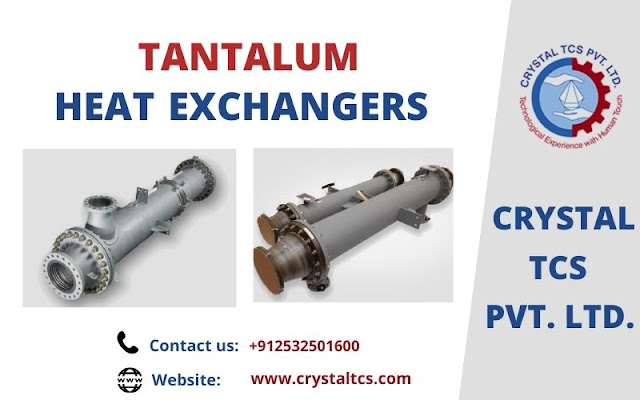Tantalum heat exchanger comprises Tantalum tubes with Carbon Steel Shell. The development comprises a completely welded metal structure. Tantalum is immune to thermal and mechanical shock. The tantalum heat exchangers have a future of around 7 to 8 years. And it needs to be clean after 2 to 3 years. A Tantalum Heat Exchanger uses a totally welded metal plan that has no gaskets to spill out. The tantalum heat exchangers are normally subject to Dye Penetration for surface cracks detection, Hydro testing and for certain situation Helium leak testing to check the equipment leakage.
Tantalum Heat Exchangers for Ultimate Corrosion resistance:
- Sulfuric acid
- Phosphoric acid
- Bromines and their mixtures
- Nitric acid
- Hydrochloric acid
- Strong organic acids
 |
| Tantalum Heat Exchangers |
The ability of tantalum to resist severe corrosion makes it an ideal choice for heat exchangers with highly corrosive process fluids. Severe Corrosive environments involved in heating /boiling of corrosive acids in tanks can be comfortably handled by Tantalum Bayonet Heaters.
Typical Applications :
Pickling
Tantalum Heat Exchangers are now emerging as a fulfilling solution towards the needs of the pickling process.
Tantalum’s robust resistance to HCL and H2SO4 corrosion along with its ability to withstand high temperatures in continuous operation has minimized downtime and nullified stoppages in pickling lines due to Heat exchanger problems.
These Heat exchangers are Shell and tube Type and the use of Carbon Steel for shell material and FRP chambers for Acid Inlet and Outlet has made Tantalum Heat exchangers a cost- effective solution for pickling.
Sulphuric Acid Concentration Systems
In a sulphuric acid concentration system, dilute sulphuric acid is heated to high temperatures to evaporate the water content which in turn increases concentration.
The extreme corrosive nature of sulphuric acid, the change in corrosive activity as the acid becomes concentrated, combined with the high temperatures makes the heat exchanges vulnerable to extreme corrosive environments.
A typical Sulphuric acid concentration system operates with Steam at 20 bar at temp more than 200°C to raise the concentration of dilute acid to more than 90%, Tantalum has an excellent
Nitric Acid concentration system and Processes involving Nitric acid based compounds
Nitric acid concentration systems present a highly corrosive environment to the equipment and the high pressures and temperatures further increases the severity of the process. Tantalum Reboiler or Tantalum Bayonet Heat Exchangers are typically used for these systems.
Chemical processes involving Nitric acid compounds are corrosive in nature. Heat Exchangers made out of Titanium, Hastelloys and even tantalum are used for these applications
Pharmaceutical Industry
The purity requirements in the pharmaceutical Industries are satisfactorily fulfilled by Tantalum, Titanium and Hastelloy based Heat Exchangers. The metallic construction also allows the Heat Exchanger to withstand high pressures and temperatures.
CrystalTCS's Heat Exchangers are utilized in the Chemical and Process Industry and have guaranteed a long and peaceful activity for our customers. We additionally supply custom made Heating/Cooling Coils to fulfil little heat duties and tank Heating Applications. Crystal TCS cope with different sorts of Heat Exchangers, for example, Shell and tube Heat Exchangers, Bayonet Type Heat Exchangers, Hairpin Exchangers, Tantalum Heat Exchangers.
Crystal TCS Pvt. Ltd
Contact us: +91 2532501600
Comments
Post a Comment